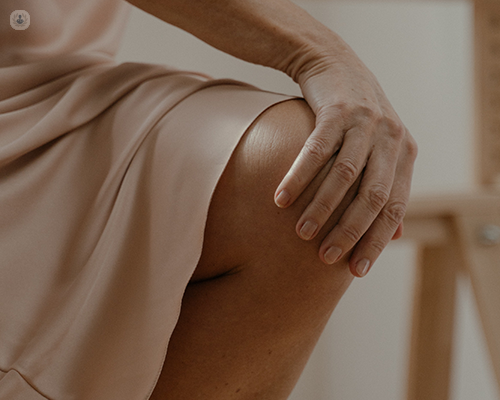Knee arthritis: What are the associated risk factors?
Written in association with:Knee arthritis is a condition that occurs when the cartilage in the knee joint wears down, causing inflammation of the joint.
Here to provide an expert insight into knee arthritis, including symptoms, risk factors and management, is Mr Stephen Veitch, leading orthopaedic hip and knee surgeon.

What are the early warning signs and symptoms of knee arthritis?
The main symptom of knee arthritis is pain, which is felt around the knee and made worse with activities such as walking, bending, and twisting. Often, stiffness in the knee joint occurs alongside pain, making it difficult for patients with knee arthritis to bend their knee.
As well as pain and stiffness, patients with knee arthritis may also have a tendency for their knee to give way, particularly when walking downstairs. This is the result of a loss in the normal leg alignment, which can be noticed when patients with arthritis stand in front of the mirror.
Other early symptoms of knee arthritis include swelling and limping.
What are the associated risk factors?
Extra bodyweight puts more pressure on joints, accelerating the destruction of cartilage. For this reason, patients who are overweight are at increased risk for knee arthritis; women who are overweight have nearly four times the risk, while the risk is five times greater for men who are overweight.
Likewise, patients with underlying systemic inflammatory joint conditions, such as rheumatoid arthritis, are at increased risk for knee arthritis.
Some patients also have a genetic predisposition for knee arthritis (“arthritis runs in the family”), especially if their parents needed joint replacements at a relatively young age.
Finally, patients who had previous knee surgery and patients with a previous history of a significant knee injury, such as a ligament rupture or a fracture, are also more likely to develop knee arthritis.
When should I get checked out for knee arthritis?
If the symptoms of knee arthritis, such as pain, stiffness, and limited function, persist for more than a few weeks then patients should seek advice from a healthcare professional.
If I am diagnosed with knee arthritis, what should I avoid doing?
Following diagnosis, it is important to remain active, as regular activity helps ease the pain associated with arthritis. Patients may need to modify their activities from high-impact exercises, such as running, to low-impact activities like walking, cycling and swimming. As well as being physically active, patients should also try to keep their weight under control.
In some cases, patients may also need to consider taking nutritional supplements, such as glucosamine and chondroitin sulphate, to relieve pain and slow down the deterioration of cartilage.
How is knee arthritis managed and treated most effectively?
By having a consultation with a healthcare professional, who can assess, diagnose, and recommend treatment options that would work best to meet a patient's individual needs.
If you are experiencing symptoms of knee arthritis and wish to seek expert management and treatment, make sure to visit Mr Veitch’s Top Doctors profile today.


